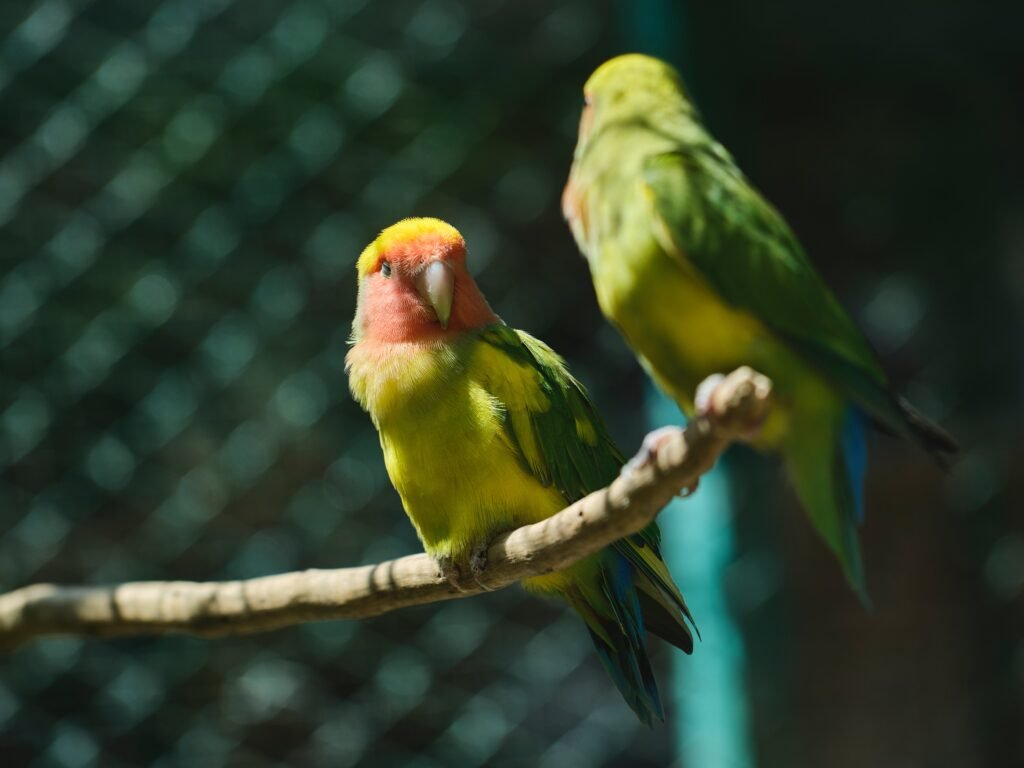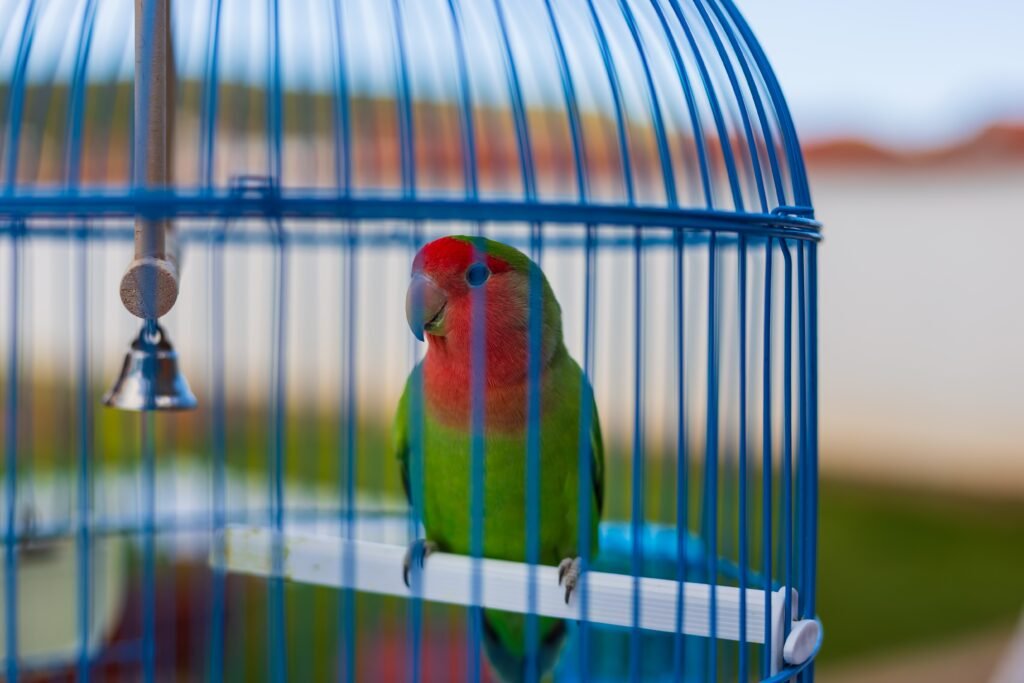Lovebirds, with their vibrant colours and affectionate nature, make wonderful companions. As a responsible pet owner, it’s essential to prioritize their health and well-being. By following a few simple guidelines and maintaining a proper care routine, you can ensure that your lovebirds thrive and live a long, happy life. In this comprehensive guide, we will explore various aspects of lovebirds’ health and provide valuable insights on keeping them in prime condition.
Understanding Lovebirds’ Basic Health Needs
Before delving into specific health tips, it’s crucial to understand the basic health needs of lovebirds. Having a sound knowledge base, you can better identify any signs of illness and take appropriate action. Here are some fundamental aspects to consider:
- Diet and Nutrition
A balanced and nutritious diet is vital for your lovebirds’ overall well-being. In addition to providing a variety of fresh fruits and vegetables, it’s important to include high-quality pellets in their diet. Leafy greens, such as kale and spinach, are excellent sources of essential vitamins and minerals that support their immune system and overall health. Offering a reasonable amount of seeds and grains is also beneficial, as these mimic their natural foraging behaviour, providing mental stimulation and satisfaction.
Consider incorporating other healthy foods into their feeding routine to ensure a varied diet. Some options include carrots, broccoli, apples, and berries. Avoid feeding them foods toxic to birds, such as avocado, chocolate, caffeine, and alcohol.
- Hydration
Proper hydration is essential for lovebirds’ health, and fresh, clean water should always be readily available. To prevent dehydration, change the water in their cage daily and ensure the water dish is easily accessible. Lovebirds may also enjoy a misting session or a shallow dish of water for bathing, which helps them maintain their plumage and overall cleanliness.
- Cleanliness and Hygiene
Maintaining a clean and hygienic living environment is crucial for preventing the spread of diseases. Regularly clean their cage, perches, toys, and food/water dishes to remove accumulated dirt, feathers, or droppings. Avoid using harsh chemicals and opt for bird-safe cleaning solutions. It’s important to disinfect their living space periodically to eliminate potential bacteria or parasites.
Additionally, lovebirds appreciate frequent baths or misting sessions to help them stay clean and comfortable. Using a spray bottle, you can provide a shallow dish of water for them to bathe in or gently mist them with lukewarm water. This helps with their plumage and provides them with mental stimulation.
- Exercise and Mental Stimulation
Lovebirds are active birds that require ample exercise and mental stimulation to maintain their physical and mental well-being. Provide them with plenty of toys, perches of varying sizes, and opportunities for flight within a safe environment. Toys encouraging foraging behaviour, such as puzzle or treat-dispensing toys, can help keep them mentally engaged and prevent boredom.
Daily interaction and playtime outside the cage are also important for their health. Allow them to explore a secure and supervised area, such as a bird-proofed room or an outdoor aviary, where they can stretch their wings and exercise. This provides physical exercise and strengthens the bond between you and your lovebirds.
Common Health Issues in Lovebirds
While lovebirds are generally hardy, they are susceptible to certain health issues. Knowing these common ailments will help you detect potential problems early on. Here are a few health conditions often observed in lovebirds:
- Respiratory Infections
Respiratory infections, such as avian chlamydiosis and aspergillosis, can affect lovebirds. These infections can be caused by exposure to drafts, poor ventilation, or mould or bacteria in their environment. Symptoms may include sneezing, wheezing, nasal discharge, and difficulty breathing. If you notice these signs, consult a veterinarian immediately for a proper diagnosis and treatment plan.
- Feather Plucking
Feather plucking is a behavioural issue that can occur for various reasons, including boredom, stress, or underlying health problems. It is important to monitor your lovebirds for any signs of excessive feather plucking, such as bald patches or broken feathers. Feather plucking can lead to skin infections or self-inflicted wounds if left untreated. If you notice any changes in their feather condition, consult a veterinarian to address the underlying cause and provide appropriate intervention.
- Psittacine Beak and Feather Disease
Psittacine Beak and Feather Disease (PBFD) is a viral infection that primarily affects the feathers and beaks of lovebirds. This disease can cause abnormal feather growth, beak deformities, and weight loss. It is highly contagious among birds and can be transmitted through feather dust, droppings, or contaminated surfaces. Ensure your lovebirds receive regular avian check-ups to detect and manage this disease effectively. If your lovebirds are diagnosed with PBFD, isolating them from other birds and following strict hygiene protocols to prevent further virus spread is crucial.
- Obesity
Lovebirds can be prone to obesity if their diet lacks proper balance or they lead a sedentary lifestyle. Obesity can lead to various health issues, including cardiovascular problems, joint pain, and liver disease. To prevent obesity, monitor their weight and adjust their diet and exercise routine accordingly. Ensure they have ample opportunities for exercise, such as flying, climbing, and playing with toys. Engaging them in mentally stimulating activities, such as training or puzzle-solving, can also help keep them active and prevent weight gain.
- Egg Binding
Female lovebirds may experience difficulties in laying eggs, known as egg binding. This condition occurs when an egg becomes stuck in the reproductive tract, leading to potential complications. Egg binding can be life-threatening if not addressed promptly. If you notice behavioural changes, such as prolonged nesting activity, straining, or signs of discomfort, seek immediate veterinary assistance. An avian veterinarian can provide the necessary medical intervention to help the bird pass the egg safely and prevent further complications.
Preventive Measures for Lovebirds’ Health
Prevention is always better than cure for your lovebirds’ health. By adopting these preventive measures, you can minimize the risk of health issues and ensure your birds are in excellent condition:
- Regular Veterinary Check-ups
Schedule regular visits to an avian veterinarian who can provide comprehensive health examinations and address concerns. Routine check-ups allow for early detection of potential problems and timely intervention. Your veterinarian may recommend specific vaccinations or tests based on your lovebirds’ health history and risk factors.
- Quarantine New Birds
If you plan to introduce a new lovebird to your existing flock, it is crucial to quarantine them initially. Quarantine helps prevent the spread of potential diseases from the newcomer to the existing birds. Keep the new bird in a separate room or cage, and only allow direct contact with the existing birds once the quarantine period is complete. During this time, monitor the new bird for any signs of illness and consult a veterinarian if needed.
- Provide a Safe and Stimulating Environment
Create a safe and stimulating environment for your lovebirds by offering a spacious cage that allows them to move and stretch their wings comfortably. Provide appropriate perches of varying sizes and textures to promote foot health and prevent pressure sores. Toys encouraging mental stimulation, such as puzzle toys, swings, and bells, can provide entertainment and prevent boredom. Minimize exposure to toxic substances, such as tobacco smoke, household chemicals, and non-stick cookware fumes, as these can harm your birds’ respiratory system.
- Social Interaction
Lovebirds are highly social creatures and interaction with their human companion is essential for their well-being. Spending quality time with your birds daily provides them with mental stimulation and affection. Engage in activities such as talking to them, teaching them tricks, or offering treats during training sessions. This helps strengthen the bond between you and your lovebirds and promotes their happiness and emotional well-being.
- Stress Reduction
Avoid subjecting your lovebirds to stressful situations. Loud noises, sudden changes in their environment, or excessive handling can cause stress in these sensitive birds. Maintain a calm and peaceful atmosphere around them and provide a consistent daily routine. If you need to change their environment or routine, gradually allow them time to adjust. Creating a peaceful environment with minimal disturbances promotes their overall health and reduces the risk of stress-related health issues.
In conclusion, maintaining the health and well-being of your lovebirds is of utmost importance as a responsible pet owner. By understanding their basic health needs, being aware of common health issues, and implementing preventive measures, you can provide them with a happy and healthy life. Remember to consult a veterinarian for personalized advice and guidance specific to your lovebirds’ unique requirements. Your lovebirds will flourish and bring you joy for years with proper care and attention.
Lovebirds Health: FAQ
Here are some frequently asked questions about lovebirds’ health and their answers:
- What should I include in my lovebirds’ diet?
A balanced and nutritious diet for lovebirds should include a variety of fresh fruits and vegetables, high-quality pellets, seeds, and grains. Leafy greens like kale and spinach are excellent sources of essential vitamins and minerals. However, it’s important to avoid feeding them foods toxic to birds, such as avocado, chocolate, caffeine, and alcohol.
- How can I ensure my lovebirds stay hydrated?
Proper hydration is crucial for lovebirds’ health. Always provide fresh, clean water in their cage and change it daily. Lovebirds may also enjoy misting sessions or a shallow dish of water for bathing, which helps them maintain their plumage and overall cleanliness.
- How do I maintain cleanliness and hygiene for my lovebirds?
To maintain a clean and hygienic environment for your lovebirds, regularly clean their cage, perches, toys, and food/water dishes. Use bird-safe cleaning solutions and disinfect their living space periodically to eliminate potential bacteria or parasites. Lovebirds appreciate frequent baths or misting sessions to help them stay clean and comfortable.
- How can I provide exercise and mental stimulation for my lovebirds?
Lovebirds are active birds that require ample exercise and mental stimulation. Provide them with plenty of toys, perches of varying sizes, and opportunities for flight within a safe environment. Toys that encourage foraging behaviour and puzzles can help keep them mentally engaged. Daily interaction and playtime outside the cage are also important for their health.


